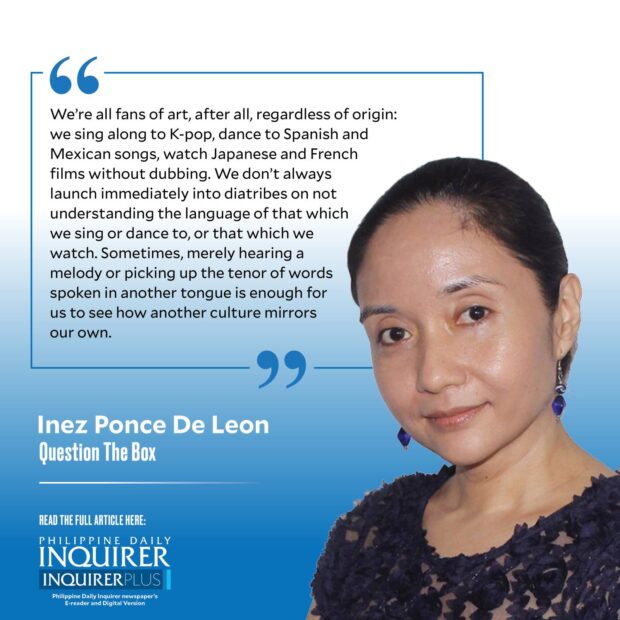The many universes of opera

Decades ago, I had the fortune (misfortune?) of watching one of the last shows at a local theater before it closed for renovation: Giuseppe Verdi’s “La Traviata.”
Foreign tenors and sopranos joined our own singers for a performance that saw borrowed or improvised costumes; a rickety stage and backstage; a crumbling, insect-ridden venue.
Before “La Traviata,” I had never watched opera live. I had listened to recordings, consulted pre-translated librettos, or read plot summaries. The souvenir program of our Sunday matinée showed only the gist of each act; and yet, for some reason, I could intuit the story.
Article continues after this advertisementMaybe it was the largely empty theater, which gave the illusion that the cast was singing only to a select few; or it was the blend of lyrics and music to create meaning; or maybe it was my burgeoning love for the Italian language. Whatever it was, it was difficult to turn my ear away, because there seemed to be a story I had to follow, and I didn’t know where it began or ended—only that it was begging to be told.
The word “opera” conjures images of fancy dresses and a central character dying at the end after belting out a final note. At its simplest, however, the word “opera” is Italian for “work.” What we are watching is not only a show, but a coming together of multiple arts: a giant orchestra of sometimes over a hundred players, a troupe of dancers on occasion, the best costume designers, singers whose voices run the range of tremblingly low to roof-splittingly high, a stage created in support of the story, and the story itself.
In March this year, I watched Giacomo Puccini’s one-act operas at Ateneo’s Areté, staged in commemoration of the composer’s 100th anniversary. The event was bigger this time: sponsored by the Italian embassy, attended by the diplomatic corps, with the Manila Symphony Orchestra, and even subtitles projected above the stage!
Article continues after this advertisementI felt the same pull, even when I knew what was going on. The first opera, “Suor Angelica,” depicted the still-persistent norms that target women who have fathered children out of wedlock and are tormented by their decisions. The second, “Gianni Schicchi,” poked fun at greed, inheritance, and the conflicts among the rich of Renaissance Florence.
It is from this latter opera that we get the famous “O Mio Babbino Caro”—not a song for a dying father, mind, but that of a rather spoiled daughter begging her dear old dad to help her boyfriend’s family!
There were issues of women, immigration, young love—and they all felt both familiar and placed in history, grounded and yet carried on the wings of music.
In May, I went to another performance at the Areté, with the same orchestra and singers, this time showcasing Puccini’s early work, and this time with a printed libretto plus translations. There were glimpses of a young, overeager composer cobbling together all his expertise in music, but with much thinner plots: Edgar’s struggles of love, Le Villi’s tragedy of young love thwarted.
Puccini, and everything opera, is close to the heart of the Italian ambassador, Mario Clemente, who has always been hands-on in bringing opera to everyone. He even brought opera to Tondo, to expand the crowd and banish the notion that theater is something to which only the rich escape.
Richard Wagner once said, “Music is the inarticulate speech of the heart, which cannot be compressed into words, because it is infinite.
”Perhaps that was what I saw years ago, in “La Traviata” and its tragic venue, as well as at the newer performances with their grander, richer settings. I was given the chance to escape to a world where music held all meaning, where words in any language were but beggars in the streets of a city crafted by melodies and notes.
Opera is one of many escapes where music reigns, and where the emotions are awakened, often without a need to understand the words immediately. We’re all fans of art, after all, regardless of origin: we sing along to K-pop, dance to Spanish and Mexican songs, watch Japanese and French films without dubbing.
We don’t always launch immediately into diatribes on not understanding the language of that which we sing or dance to, or that which we watch. Sometimes, merely hearing a melody or picking up the tenor of words spoken in another tongue is enough for us to see how another culture mirrors our own.
In the way we treat those who thought they had walked the ways of love. In the way we look down on those who achieved our accolades minus our pedigree. In the way we try to find joy, but end up somewhere else, maybe broken-hearted, maybe crying for a lost tomorrow that was once possible in our dreams.
Opera, like other art forms, has its parts that we cannot reach with complete understanding, not even with years of studying the language and culture that gave birth to it. But it is that mystery, perhaps, that allows us to keep seeking connections with our lives until we find the single note that reminds us of the depths of both love and grief shared by all humanity.
iponcedeleon@ateneo.edu
















